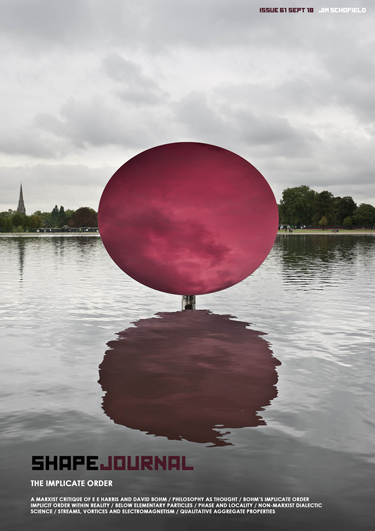Welcome to Issue 61 of the SHAPE Journal, entitled The Implicate Order, in which we examine notions of Dialectical Holism in Physics.
This series of papers attempts to draw a definitive line between the philosophical stance of physicist David Bohm, and his rejection of the Copenhagen Interpretation of Quantum Theory, on the one hand, and the seemingly-convergent Idealist philosophy of Errol Harris on the other, and to do so from an emerging Marxist standpoint in that crucial area.
The connections between these two thinkers were brought to my attention by my namesake James Schofield, and his thesis on the “Dialectical Holism” of the latter. His PhD deals with some interesting Physics and this introduced me to concepts such as Ontic Structural Realism, and set me thinking about Bohm seriously again. So thanks, James!
It is, and has been, very important because of the total lack of a Marxist critique of Copenhagen, via a clearly explained and explanatory superior alternative stance in Sub Atomic Physics. Indeed, this key absence has been so important that is has even frequently disabled the Marxist stance too, even politically! For, these seemingly obscure questions always were of paramount importance from the time of Karl Marx’s split from Hegelian Idealism. For, without the conquest of Science by this new Materialist stance, it would be crucially disabled in everything else that it dealt with. Marx knew it, and intended to deal with it, but he was a philosopher and an academic historian, by training, and ill-equipped to tackle such a wide-ranging discipline as Science-in-general.
In addition, his historical studies with the new standpoint immediately required the conquest of Economics, as the touchstone for the tumultuous, indeed, revolutionary changes that were so important in the developments of Human Societies throughout History. His initial task, therefore, just had to be a very different treatment of Capitalist Economics, and the change turned out to present him with an enormous undertaking, recasting the whole of that subject from an entirely different and wholly new basis. This took him the rest of his life, and Science in general was never addressed by Marx.
The dangers of this crucial omission were realised by V. I. Lenin, when key members of the leadership of the Bolshevik Party had begun to show great interest in the positivist Physics of Henri Poincaré and Ernst Mach, which was understandable because of this evident hole in the Marxist stance.
Lenin knew, immediately, that this was serious, and he immediately set about a refutation of the Positivists in his book Materialism and Empirio Criticism - which successfully pulled Lunacharsky and others back into the fold, philosophically! But, he too was no physicist, so the hole was still not filled, and hasn’t been ever since.
Clearly, to this Physicist and Marxist that vital task is the most important in contemporary Philosophy; and this is already well underway. But the long standing historical omission of this undertaking could not but encourage committed Marxists to seek a world-class physicist who strongly rejected the Copenhagen stance, and the increasingly dominant candidate was David Bohm.
Indeed, in my youth I too sought answers with Bohm’s alternatives, but the problems in Science were extremely well entrenched and surprisingly old. In spite of Bohm’s Materialism, there was with him, as with all scientists, a very long-standing Idealism, imported via Mathematics, and a Plurality via Abstraction - yet also and surprisingly Holism via Explanation, all amalgamated via the crucial glue of Pragmatism. This uneasy mix actually underpinned the whole of Science, and Pragmatism alone allowed a switching between different areas of study, where different assumptions “could work”.
And, of course the co-existence of these directly contradictory stances was not realised by those involved: they considered a “seemingly-contradictory-appearance” as being due to as yet not-fully-understood-areas, which would, later, be removed by new Knowledge. But, that would never be the case, whilever this unaware amalgam prevailed. And, the differences between Einstein and the Copenhageners, and between Bohm and the rest were all due to this congenitally-contradictory, assumed Amalgam as Basis.
So clearly, Bohm has to be dealt with, as vitally as Lenin had to deal with the Positivists, but this time fundamentally..




